A recent investigation into sexual ageplay in Second Life has brought to light a deeply concerning issue within the virtual world. The detailed examination of various locations, avatars, and activities reveals a disturbing trend of sexualizing child avatars and promoting inappropriate interactions between adults and minors. This investigation echoes a similar expose from over a decade ago, when Sky News published an article titled “Investigation: Paedophilia And Second Life” in 2011. It’s been nearly two decades since the German news article mentioned in this more recent investigation by the pseudonymous Robert Bartos. Despite the passage of time, it is alarming to note that many of the issues highlighted in both investigations remain prevalent today.
This article has an older sibling, which can be located here.
This article series may be subjected to additional articles in the future.
Similar to the findings of the 2011 article, the recent investigation uncovers the existence of locations in Second Life where individuals engage in sexual ageplay with avatars resembling children. Despite policies against such behavior, these spaces continue to thrive, with explicit content readily available and even endorsed by certain individuals associated with Linden Lab. In the Sky News article, concerns were raised about the lack of accountability and oversight within Second Life, particularly regarding the presence of sexualized content involving minors. Shockingly, over a decade later, it appears that little has changed in this regard. The recent investigation exposes the alleged involvement of Linden Lab Product Operations personnel in perpetuating the problem, highlighting systemic failures in addressing child protection measures.
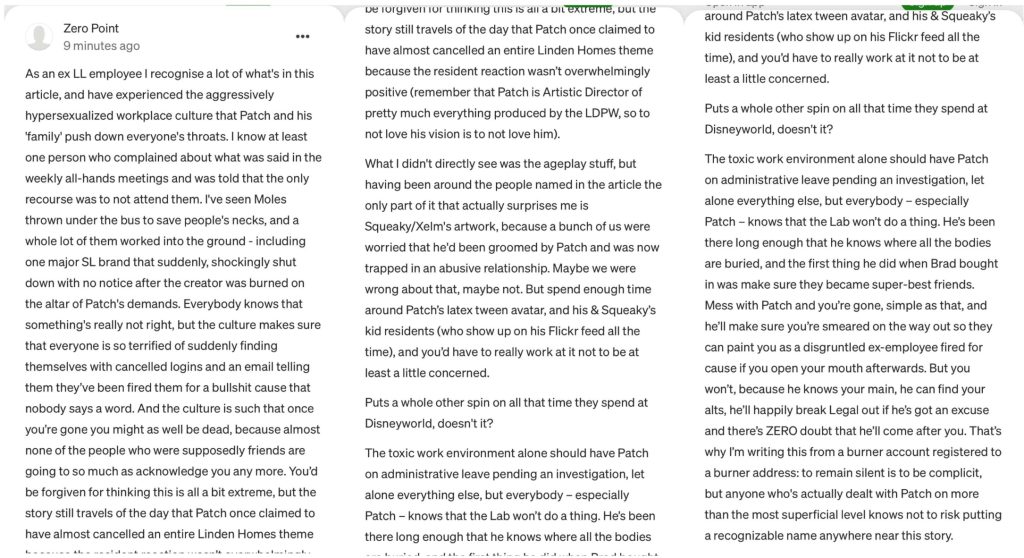
Furthermore, the Sky News article highlighted the ease with which individuals could access explicit content and engage in inappropriate activities within Second Life. Despite promises of increased moderation and enforcement, it is evident from the recent investigation that these efforts have been insufficient, allowing sexual ageplay to persist virtually unchecked. The failure of Linden Lab to address the issues raised in the 2011 article, coupled with the lack of meaningful action in response to the recent investigation, underscores a decade of neglect and inaction. Despite repeated calls for stricter measures and improved safeguards, the company has failed to uphold its responsibility to protect users, particularly minors, from exploitation and abuse.
Amidst the complex and sensitive investigation into sexual ageplay within Second Life, the bravery and dedication of writer Robert Bartos (alias) shine through as beacons of integrity and ethical journalism. Publishing their comprehensive research on Medium.com, a platform known for its commitment to freedom of expression and independent reporting, Bartos has provided a vital service by shedding light on a disturbing issue that has long been overlooked. In an environment where speaking out against powerful entities can carry significant risks, Bartos’ decision to publish under an alias demonstrates a deep commitment to the truth and a genuine concern for the well-being of Second Life users, particularly minors. Their tireless efforts to uncover the truth and hold accountable those responsible for perpetuating sexual ageplay deserve commendation and recognition. Bartos’ courage serves as an inspiration to all journalists and advocates striving to expose injustices and protect vulnerable communities.
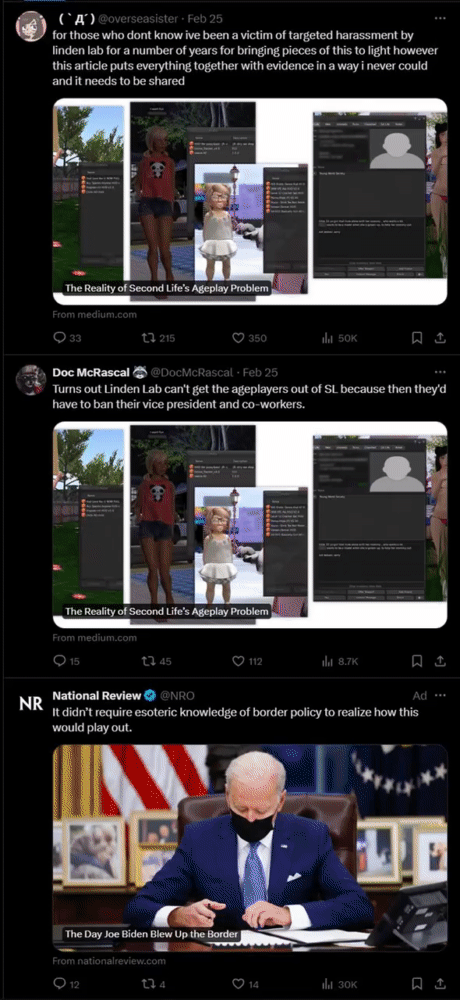
In response to the critique levied against the original article, it’s essential to address the issues raised with clarity and precision. Firstly, the dismissal of Robert Bartos’ research based on the pseudonym under which it was published is misguided. The focus should be on the substance of the investigation rather than the identity of the author. Medium.com, known for its commitment to diverse perspectives and in-depth analysis, provides a platform for rigorous journalism regardless of the author’s chosen name. Moreover, attempting to discredit Bartos’s findings by associating them with another speculative article undermines the seriousness of the issue at hand. The suggestion that the scandal surrounding sexual ageplay in Second Life is merely a conflict among furry clans lacks substantiation and distracts from the urgent need to address the exploitation of minors in virtual environments.
Furthermore, the characterization of concerns raised by individuals as “loonier” or “wacky” overlooks the complexity of the situation. While not every perspective may align with mainstream discourse, dismissing them outright undermines the value of open dialogue and critical inquiry. It’s crucial to engage with differing viewpoints respectfully and thoughtfully, rather than resorting to ad hominem attacks or sweeping generalizations. The wider community must also play a role in condemning and reporting instances of sexual ageplay, and advocating for safer environments for all users. Second Life should be a platform for creativity, exploration, and social interaction, not a haven for exploitation and abuse.
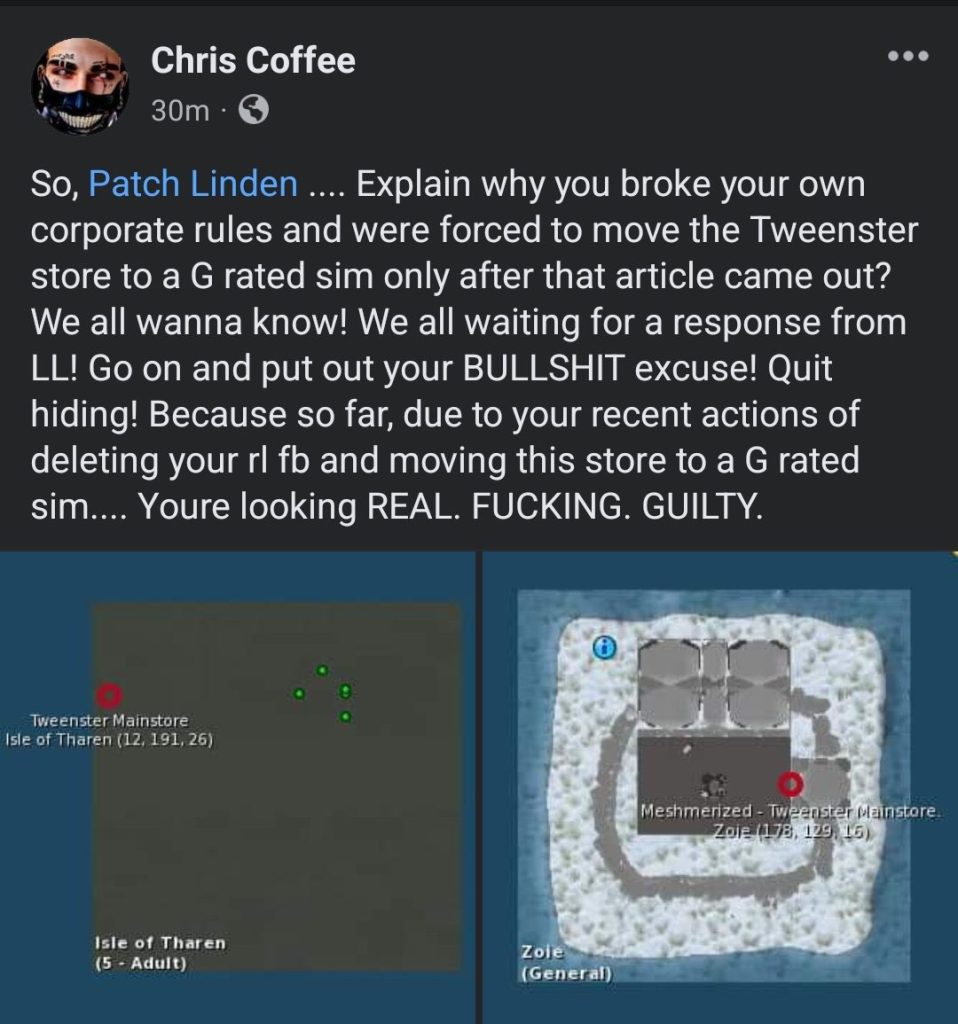
Critics emerging from the shadows, seemingly as paid opposition, have cast a shadow over the discourse surrounding the thorough research conducted on this topic. Their efforts often involve promoting misinformation and resorting to slander against those who have diligently investigated the concerning phenomenon of sexual ageplay in virtual environments like Second Life. Rather than engaging in constructive dialogue or addressing the substantive findings presented, these critics opt for tactics aimed at discrediting the researchers and their work. This deliberate obfuscation not only undermines the gravity of the issue but also obstructs efforts to raise awareness and implement meaningful solutions. In the face of such opposition, it becomes increasingly important to maintain a commitment to rigorous investigation, transparency, and accountability, ensuring that the voices of those advocating for the protection of vulnerable communities are not silenced or marginalized.

In addition to the paid opposition, it’s noteworthy that certain minority communities of the internet, such as homosexuals and furries, have been observed to align themselves in defense of the behavior condemned in these articles. This alignment is multifaceted and can stem from a variety of factors, including a desire to protect their own interests or subcultures, a fear of stigmatization or discrimination, or a genuine misunderstanding of the gravity of the issue at hand. While it’s essential to recognize and respect the rights and identities of all individuals, it’s equally crucial to acknowledge that defending actions that exploit and sexualize minors undermines the integrity of these communities and perpetuates harm. By fostering open dialogue and promoting education within these communities, we can work towards cultivating a culture of accountability, empathy, and respect for the safety and well-being of all individuals, regardless of their background or orientation.

Since the investigation, Patch Linden, also known as Eric Nix, has taken drastic measures to cover up his online presence by deleting all his social media pages. This attempt at concealment raises serious questions about his transparency and accountability, especially considering the gravity of the allegations against him. It’s important to note that our discussions and revelations are not rooted in slander or baseless accusations. We have meticulously documented and saved all the evidence, including screenshots and archives of his now-deleted social media activity, ensuring that the truth remains accessible and undeniable. Our commitment to uncovering the facts and holding individuals accountable for their actions remains unwavering, regardless of any attempts to suppress information or evade scrutiny.

The portrayal of Linden Lab’s Product Operations department as being gay male dominated prompts speculation about the potential alliances formed within the company’s internal dynamics. Given the prevalence of gay males in key positions, it’s plausible to suggest that there may exist alliances or networks based on shared identities or interests. In particular, minority communities such as homosexuals and furries, who may face discrimination or marginalization in broader society, could be more inclined to form alliances to navigate or challenge the existing power structures within the company. These alliances might serve as platforms for solidarity and mutual support, potentially influencing the company’s culture and decision-making processes.
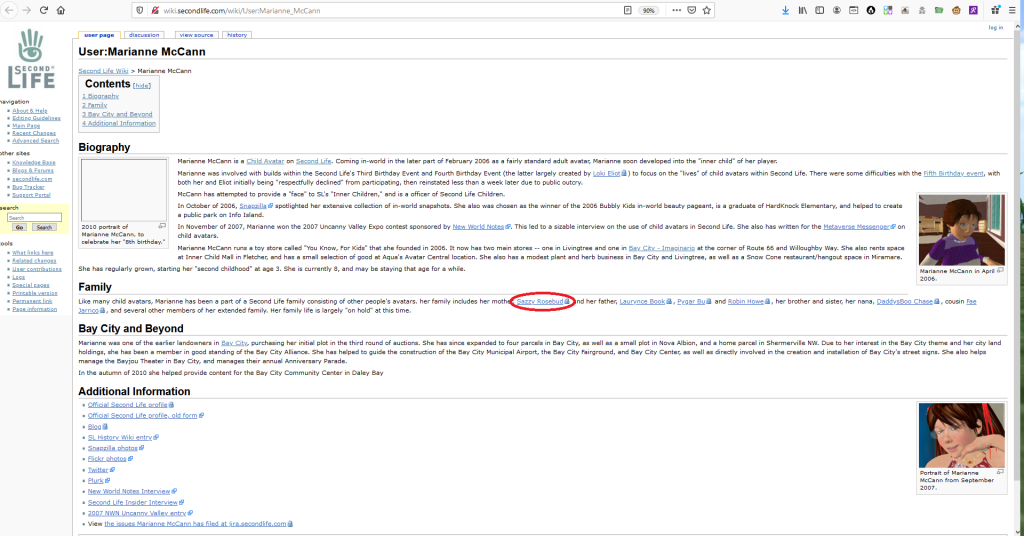
The concept of transhumanism often involves the pursuit of transcending human limitations through technological augmentation, leading some to argue that it could result in a divergence from traditional human characteristics and values. This philosophical stance raises concerns about the potential for individuals to become alienated from what is inherently human, as they strive for enhanced capabilities and altered states of being. San Francisco, renowned for its progressive attitudes and technological innovation, is often cited as emblematic of this trend. With its reputation as one of the most liberal and LGBTQ+ friendly cities in the Western world, coupled with its status as a major tech hub, San Francisco embodies a culture that celebrates both technological advancement and diverse expressions of human identity. However, critics argue that this pursuit of progress and diversity has led to a form of decadence, where the prioritization of individual desires and technological pursuits overshadows traditional moral and social values. This perspective posits that San Francisco’s embrace of both homosexuality and technological innovation has contributed to a societal shift away from conventional norms, potentially leading to a sense of moral decay or cultural decline in the eyes of some observers. If one wishes to witness the manifestation of aforementioned moral decay, one only needs to delve into NAMBLA or the San Fransisco Gay Man’s Chorus.

Robert Bartos’ article has had a profound impact on bringing attention to the pressing issues discussed in my previous article from May. Following the publication of Bartos’ piece, there was a sudden surge of interest in the topic, with thousands of users flocking to read and engage with the content on a daily basis. However, with increased visibility also came a rise in cyberattacks aimed at compromising the integrity of our network. Recognizing the importance of safeguarding our platform and ensuring the security of our data, we swiftly responded by bolstering our network’s security measures to fend off these malicious attacks. Despite the challenges posed by these cyber threats, the heightened attention generated by Bartos’ article reaffirmed the significance of shedding light on critical issues and the importance of maintaining a vigilant stance in the face of adversity.
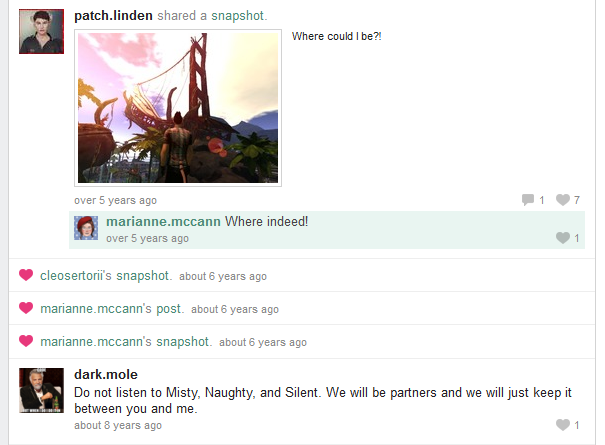
In my previous article, I delved into the distressing reality of furry sex abuse cases within virtual communities like Second Life. These cases revealed a pattern of exploitation and manipulation targeting vulnerable individuals, particularly minors, within the furry fandom. The investigation uncovered numerous instances of grooming, coercion, and sexual exploitation perpetrated by individuals masquerading as members of the furry community. Shocking accounts emerged of underage individuals being lured into inappropriate and harmful situations, with perpetrators using virtual avatars to conceal their identities and facilitate their predatory behavior. Additionally, the article highlighted the distribution of child pornography and the creation of illicit virtual spaces where underage individuals were subjected to explicit and abusive activities. Despite the existence of content policies aimed at preventing such misconduct, the lax enforcement and oversight by platform administrators allowed these abuses to persist unchecked, raising serious concerns about the safety of minors in online environments. These revelations underscored the urgent need for platforms like Second Life to implement more robust safeguards and proactive measures to protect vulnerable users, particularly minors, from exploitation and abuse. The article’s in-depth examination of these cases shed light on the dark underbelly of the furry community and served as a wake-up call for the need to prioritize child safety in virtual spaces.

As Bartos’ article gained traction and stirred discussions on the platform, it also attracted unwarranted attention from individuals seeking to suppress dissenting voices. False reports targeting Bartos’ article have surfaced, with attempts made to have it removed from Medium.com. This targeted censorship underscores the importance of having alternative platforms that prioritize free expression and are immune to such undue pressure. It’s evident that the foresight in creating THUG.TV’s standalone network, which operates independently from mainstream platforms, has proven invaluable. By circumventing the scrutiny and potential biases of mainstream network hosts, THUG.TV can continue its mission to shed light on critical issues without fear of unwarranted censorship or suppression.
Speculating on the integrity of the QAnon conspiracy in contrast with the content of this article raises intriguing questions about the nature of online movements and their reliability. While QAnon has garnered significant attention and amassed a following based on its claims of uncovering deep-state conspiracies, the evidence presented in this article provides a stark contrast. Unlike the anonymous and often unfounded assertions made by QAnon, the information presented here is grounded in thorough research, documented evidence, and credible sources. It underscores the importance of critical thinking and discernment when engaging with online narratives, highlighting the potential dangers of blindly following unsubstantiated claims. As this article sheds light on real-world issues such as child exploitation and corporate misconduct, it serves as a reminder to approach online movements with skepticism and scrutiny, prioritizing verifiable facts over sensationalized rhetoric. The details presented in this article, coupled with Linden Lab’s prior political stances, starkly contrast the narrative of the QAnon conspiracy.

The expression of hatred towards Christianity in the Blessing On The Heretics, calling for genocide against Christians, is deeply troubling and indicative of the extreme sentiments that can arise from religious zealotry. This sentiment appears to fuel the fire behind religious extremism, including elements of Zionism and Jewish extremism. The two-region-wide Easter Egg meme mocking the resurrection of Christ serves as a stark reminder of the potential for religious extremists to use virtual platforms as an outlet to vent their hatred. Such expressions of intolerance not only perpetuate division and animosity but also pose a threat to the principles of religious freedom and coexistence. It’s imperative to address and condemn such extremist ideologies, promoting dialogue, understanding, and mutual respect among different religious communities. Only through fostering tolerance and acceptance can we combat the destructive forces of religious extremism and work towards a more peaceful and inclusive society. Israel’s historical reputation for providing sanctuary to convicted pedophiles stands as an eerie testament in contrast to Linden Lab’s two-region-wide religious monolith. The persistence in allowing such a monument to exist while persecuting much less harmful behavior is absurd.
Easter Egg hunts and fishing minigames serve as enticing baits on Second Life, drawing in minors who seek avenues to earn money, especially considering many lack payment information. This practice raises concerns about exploitation and underage involvement in virtual economies. Moreover, Tilia and Second Life’s lax regulations regarding user verification directly violate the FinCEN’s Money Service Business and Money Transmitter rules. With Linden Lab and Tilia facing upwards of a $5,000 fine per violation, the SEC essentially owns both companies already. By permitting users to handle and transfer Linden dollars within the game without stringent ID verification measures, they may inadvertently facilitate fraudulent activities, money laundering, and other illicit transactions, posing significant risks to financial security and regulatory compliance. These modern digital currency laws exist for exactly these purposes and the fact that Linden Lab refuses to get with the times, continuing to allow these illegal transactions goes to show that the company does not fear legal ramifications and/or they prioritize the exploitation of minors over any legal prosecution they may face.

The involvement of tech elites in satanic or pedophilic rituals presents a chilling prospect that cannot be ignored. Instances of underground gatherings and secretive clubs, such as Bohemian Grove, where influential figures converge for purportedly clandestine activities, raise serious concerns about the abuse of power and the erosion of ethical boundaries. The potential implications of such gatherings extend far beyond mere speculation, as they could signify a profound threat to the fabric of society. If allegations of satanic or pedophilic practices are substantiated, it would not only shatter public trust in these individuals but also underscore the urgent need for transparency and accountability in positions of power. Moreover, any attempt to silence dissent or curtail freedom of speech regarding these matters could have dire consequences for democracy and civil liberties. It is imperative that allegations of misconduct, particularly those involving the abuse of vulnerable individuals, are thoroughly investigated and addressed with the utmost seriousness to safeguard the integrity of society as a whole.

At first glance, the Linden Playground on the sim Da Boom in Second Life may seem innocent, but upon closer inspection, it reveals alarming elements of cryptic symbolism. As the first sim ever created on Second Life, it holds historical significance, yet it harbors unsettling imagery. One of the most concerning pieces within the playground is a robot reading a bill of human rights, seemingly nodding to libertarianism. While libertarianism advocates for individual freedoms, it has unfortunately attracted extreme individuals who advocate for radical beliefs in regards to free will of children and animals. This juxtaposition of innocence and potentially sinister undertones underscores the complexity of virtual environments like Second Life and raises questions about the intentions behind such symbolic representations. The fact a child’s playground was found as a cruising ground for child avatars to participate in sexual ageplay prostitution in Sky News’ 2011 investigation is extremely alarming, and the Linden Playground considered alongside is a disgraceful blemish on the company.

The notion that Second Life might serve as a psychological operation, sanctioned by the federal prison system and benefiting Big Pharma, raises profound concerns about the ethical implications of the platform’s existence. Initially marketed as an outlet for individuals struggling with mental illness and social anxieties, Second Life has morphed into a potentially detrimental environment. The lack of a defined objective within the virtual world, coupled with its unregulated nature, has transformed it into a breeding ground for mental illness and exploitation. For sex offenders, it could offer an avenue for profit and access to vulnerable individuals. Additionally, the psychological toll inflicted on users could serve as a lucrative opportunity for pharmaceutical companies, capitalizing on the resulting psychological damage. This paradigm shift underscores the need for rigorous scrutiny of virtual platforms and their impact on mental health, as well as the broader societal implications of their existence. The persistent occurrence of harmful activities linked to this game raises doubts about the federal government’s response to the company’s repeated transgressions. It prompts speculation as to whether the company itself serves as a honeypot employed by the government.

It is imperative that Linden Lab acknowledges the gravity of the situation and takes immediate and decisive action to address the longstanding issues plaguing Second Life (although it appears they are inherently part of the problem). This includes implementing stricter enforcement of policies, increasing oversight of employee conduct, and collaborating with law enforcement agencies to ensure legal compliance and accountability. In conclusion, the parallels between the recent investigation and the Sky News article from over a decade ago serve as a stark reminder of the persistent failures in addressing sexual ageplay in Second Life. It is time for Linden Lab to take meaningful action and prioritize the safety and well-being of its users, lest history continue to repeat itself.
Latest revision: 3/1/2024
Article is subject to future revisions for additional media and elaboration on existing topics.
